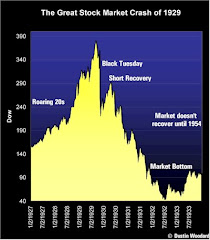Recently Arnold Schwarzenegger spoke at the Montreal Board of Trade. An article about his event was posted in the Montreal Gazette I am a little bit unique. In his first comments he spoke about the pension issue.
In California, public pension underfunding was pegged at about $50 billion, but analysis by university researchers revealed it was $500 billion, he said.
"Now the federal government is for the first time looking into what is the liability (for) each state. This will be a disaster in the future when it all comes out," he told a Board of Trade of Metropolitan Montreal luncheon.
"Right now they know about it and they should do something about it and they haven't done anything about it."
By now everyone recognizes that there is a pension tsunami coming. We are still not aware of the true extent of the damage it will cause and a lot more investigative work needs to be done to disclose the real numbers.
In anticipation of the seriousness of the tsunami some policy makers are attempting to bring about changes that will deal with the crisis. One of these is a recent proposal to allow American state to go bankrupt. The proposal was outlined in an article from the Los Angeles Times and was written by Jeb Bush, past Governor of Florida and Newt Gingrich, a Presidential hopeful. In Better off bankrupt they highlight their proposal.
During the 2008 financial crisis, the federal government reacted in a frantic, ad hoc fashion, tapping taxpayers for bailouts galore, running roughshod over the rights of bondholders and catching the American people unaware and unprepared. In contrast, we still have time to prepare for the looming crisis threatening to engulf California, Illinois, New York and other state governments.
The new Congress has the opportunity to prepare a fair, orderly, predictable and lawful approach to help struggling state governments address their financial challenges without resorting to wasteful bailouts. This approach begins with a new chapter in the federal Bankruptcy Code that provides for voluntary bankruptcy by states, a proven option already available to all cities and towns across America.
The figures for next year's budgets are staggering. California, which faces a $25.4-billion budget shortfall, will pay $100,000+ pensions to more than 12,000 state and municipal retirees this year. A Stanford study puts the state's unfunded pension obligations at more than half a trillion dollars. Illinois has a $15-billion budget deficit, prompting its governor and lame-duck Legislature to hike its personal income tax rate by 66%. New York, where 73% of the government workforce is unionized, is staring at a $10-billion deficit.
One of the key issues they try to address is:
Second, as with municipal bankruptcy, a new bankruptcy law would allow states in default or in danger of default to reorganize their finances free from their union contractual obligations. In such a reorganization, a state could propose to terminate some, all or none of its government employee union contracts and establish new compensation rates, work rules, etc. The new law could also allow states an opportunity to reform their bloated, broken and underfunded pension systems for current and future workers. The lucrative pay and benefits packages that government employee unions have received from obliging politicians over the years are perhaps the most significant hurdles for many states trying to restore fiscal health.
Recently Paul Helyer was quoted in the Winnipeg Press regarding his retrospective look at the Canada Pension Plan. The article was called Best pension plan we never got
When the original plan was presented to the Pearson cabinet in the spring of 1963, I considered it unimaginative because it addressed solely the amount of retirement income, and then only in part.
It ignored other critically important areas such as portability (from job to job), early vesting rights in private plans, the gross inequities between citizens and the economic impact of another pay-as-you-go program that would be paid from current taxes.
I considered the proposal thoughtfully and came to the conclusion that I couldn't support another unfunded plan in addition to the old age pension. It was too much at odds with the long-term interests of the baby boom generation, which would have to pay the taxes for both.
I decided to oppose the proposal to the best of my ability and, when I lost, as seemed inevitable, resign.
The alternative was universal, funded, totally portable, fully vested from Day 1, equitable, and adequate to meet the needs of all retirees. In effect, from the day a student got his or her first paycheque from McDonald's, deductions from both employer and employee would be made and deposited to the latter's retirement account.
The system would apply universally to both part-time and full-time employees in all income brackets, and be merged with all existing plans with grandfathered benefits so no one would be worse off as a result of the transition. The self-employed would be included.
Funds would be administered by 10 or 12 large Canadian financial institutions that would have included the big banks and insurance companies as well as major trust companies (before the banks were allowed to buy or merge with the trusts in order to eliminate competition).
The CPP plan did not enjoy the swift and easy passage its sponsors had hoped for. Provincial acquiescence was far from automatic.
In fact, Quebec decided it would prefer a funded plan of its own so the CPP could no longer be touted as a national plan.
Federal scouts were sent to Quebec and they came back recommending that Ottawa adopt the Quebec plan, that was partially funded, if only to make it look national in scope.
When this was agreed, the PM said the compromise was sufficient that I should stick with the ship, which I did.
When I review the file on the CPP, however, I shake my head in dismay. Every problem that could arise, did. The plan was badly underfunded so deductions had to be raised; political interference in management of the funds has been a source of constant irritation to those who seek objectivity in these matters; and, worst of all, there is no pretense of equity that was presumably the rationale for the CPP in the beginning.
So here we are, almost a half-century later, back at square one. Based on a proven record of being unable to learn from our mistakes, one can assume the policies and politics of expediency will prevail once again. Pity!
Our system of entitlements and pensions in Canada is based on the concept of an ever growing economy. Its like a giant ponzi scheme. The new people coming in work harder and increase productivity to create more wealth. Not only enough wealth for there current needs but enough to carry the wave of retirees before them. Those who are now on pensions and need healthcare.
It's the demographics stupid (Clinton).
For the past 15 years that I have been in the financial services industry we have been selling all of the features of an economy growing under the tsunami of baby boomers. We all know the story starting with diapers and going through to mutual funds. Everything the boomers needed exploded.
Now we want to sell a different story that demographics are not important any more. We won't end up like Japan. Pensions are sustainable. Let's not be so sure.
At the recent CFA (Chartered Financial Analyst) conference in Edmonton, one CFA noted the future may be anything but friendly. Looking ahead to modest recovery -- or to Armageddon
It's the demographics stupid (Clinton).
For the past 15 years that I have been in the financial services industry we have been selling all of the features of an economy growing under the tsunami of baby boomers. We all know the story starting with diapers and going through to mutual funds. Everything the boomers needed exploded.
Now we want to sell a different story that demographics are not important any more. We won't end up like Japan. Pensions are sustainable. Let's not be so sure.
At the recent CFA (Chartered Financial Analyst) conference in Edmonton, one CFA noted the future may be anything but friendly. Looking ahead to modest recovery -- or to Armageddon
Bill Tufts
Fair Pensions For All 



Go to www.chrismartenson.com and take The Crash Course, which explains the coming train wreck in a thoughtful and easy to understand manner. The course is free. And scary.
ReplyDeleteNot only are pensions hard to fully understand by many people, but with the future of pensions in Canada on the rocky side, it's crucial for people to know where their money is going compared to what they're getting back.
ReplyDeleteHopefully the retirement decision won't be so terrifying later on down the road.